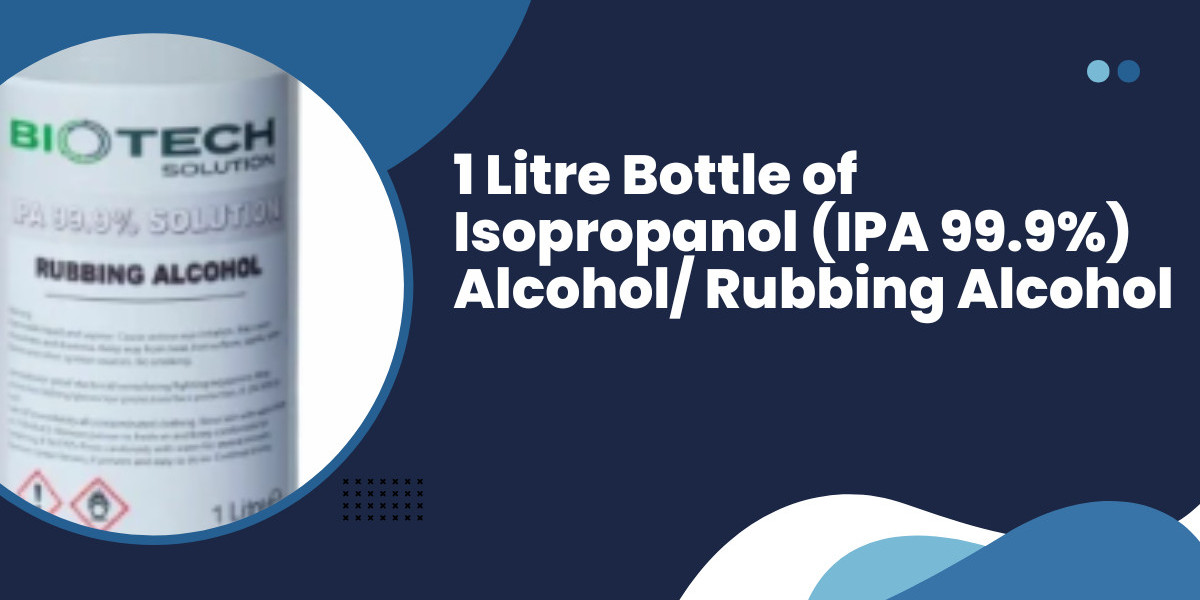When it comes to effective cleaning, disinfection, and healthcare solutions, isopropyl alcohol stands as a household and industrial staple. Its versatility makes it an essential ingredient in various products, from first-aid kits to electronics cleaning solutions. But what exactly is isopropyl alcohol, and why is it so widely used? Let’s dive into its properties, benefits, and practical applications.
What Is Isopropyl Alcohol?
Isopropyl alcohol, also known as rubbing alcohol, is a colorless, flammable chemical compound with a strong odor. Chemically classified as a secondary alcohol, it is made by combining water and propene derivatives. Commonly available in concentrations of 70% to 99%, this compound has powerful antimicrobial properties that make it ideal for a variety of uses.
Key Properties of Isopropyl Alcohol
Antimicrobial Strength: Known for its ability to kill 99.9% of bacteria, viruses, and fungi.
Rapid Evaporation: Leaves surfaces clean without a sticky residue.
Solvent Capabilities: Effectively dissolves oils, resins, and adhesives.
Non-Corrosive Nature: Safe for use on most materials, including plastics and metals.
Uses of Isopropyl Alcohol in Daily Life
1. Household Cleaning
Isopropyl alcohol is a go-to solution for cleaning surfaces, removing stains, and disinfecting high-touch areas.
Wipe down countertops, door handles, and light switches.
Remove stubborn stains from fabrics and carpets.
Degrease kitchen appliances and tools.
2. Disinfecting Electronics
Cleaning smartphones, laptops, and keyboards is easier and safer with isopropyl alcohol.
Use a microfiber cloth dampened with a 70% solution.
Effectively removes fingerprints, oils, and bacteria without harming delicate components.
3. First Aid and Wound Care
Often found in first-aid kits, isopropyl alcohol is a trusted disinfectant.
Clean minor cuts and scrapes.
Sterilize tweezers, scissors, and other medical tools.
4. Skincare and Cosmetics
In cosmetics, isopropyl alcohol acts as a solvent and antiseptic.
Found in makeup products to preserve and enhance their texture.
Used to clean makeup brushes and tools.
Why Is Isopropyl Alcohol Preferred in Healthcare?
Hospitals, clinics, and laboratories rely heavily on isopropyl alcohol for its effectiveness and safety.
It is used to disinfect surgical instruments.
Doctors apply it to the skin before injections or surgeries to prevent infections.
Its quick evaporation ensures it doesn’t interfere with medical procedures.
Quote from Experts:
"Isopropyl alcohol is indispensable in healthcare due to its fast-acting disinfectant properties," says Dr. Linda Warren, a healthcare hygiene expert.
Safety Tips for Using Isopropyl Alcohol
While isopropyl alcohol is generally safe, proper precautions should be taken.
Always use in a well-ventilated area to avoid inhaling fumes.
Keep away from heat sources, as it is highly flammable.
Store out of reach of children to prevent accidental ingestion.
Industrial Applications of Isopropyl Alcohol
Beyond household and healthcare uses, isopropyl alcohol is indispensable in industries.
Automotive Sector: Used for cleaning engines and degreasing parts.
Electronics Manufacturing: Removes solder flux and cleans circuit boards.
Pharmaceutical Industry: An essential ingredient in the production of antiseptics and sanitizers.
How to Choose the Right Isopropyl Alcohol Concentration?
Selecting the right concentration depends on your specific needs.
70% Solution: Ideal for disinfecting surfaces, as it combines water and alcohol for maximum germ-killing power.
99% Solution: Best for industrial use, such as cleaning electronics and degreasing machinery.
The Environmental Impact of Isopropyl Alcohol
As awareness grows about eco-friendly practices, concerns about isopropyl alcohol’s environmental impact have emerged.
It breaks down quickly in the environment, minimizing its ecological footprint.
Opt for recyclable containers to reduce plastic waste.
How to Properly Store Isopropyl Alcohol
To maintain its effectiveness, store isopropyl alcohol correctly.
Keep it in its original container with a tightly sealed lid.
Store in a cool, dark place away from direct sunlight and heat.
FAQs About Isopropyl Alcohol
What is the difference between isopropyl alcohol and rubbing alcohol?
Rubbing alcohol is a general term that often refers to isopropyl alcohol mixed with water. It typically contains 70% isopropyl alcohol.
Can isopropyl alcohol be used as a hand sanitizer?
Yes, isopropyl alcohol is a key ingredient in many hand sanitizers, especially when combined with moisturizers and other skin-safe components.
Is isopropyl alcohol safe for skin?
When used in moderation, isopropyl alcohol is safe for skin disinfection. However, prolonged use can cause dryness.
Does isopropyl alcohol expire?
Yes, isopropyl alcohol has a shelf life of about two years. After that, its effectiveness may decrease.
Can isopropyl alcohol damage surfaces?
It is safe for most surfaces but may damage some plastics and paints. Test a small area first.
Is isopropyl alcohol safe for pets?
Avoid using isopropyl alcohol directly on pets, as it can be toxic if ingested or absorbed through their skin.
Conclusion
From cleaning surfaces to saving lives in healthcare, isopropyl alcohol proves to be a highly versatile and indispensable compound. Its applications span across households, industries, and medicine, making it a true all-rounder. With proper use and care, it ensures safety, hygiene, and efficiency in countless tasks.










